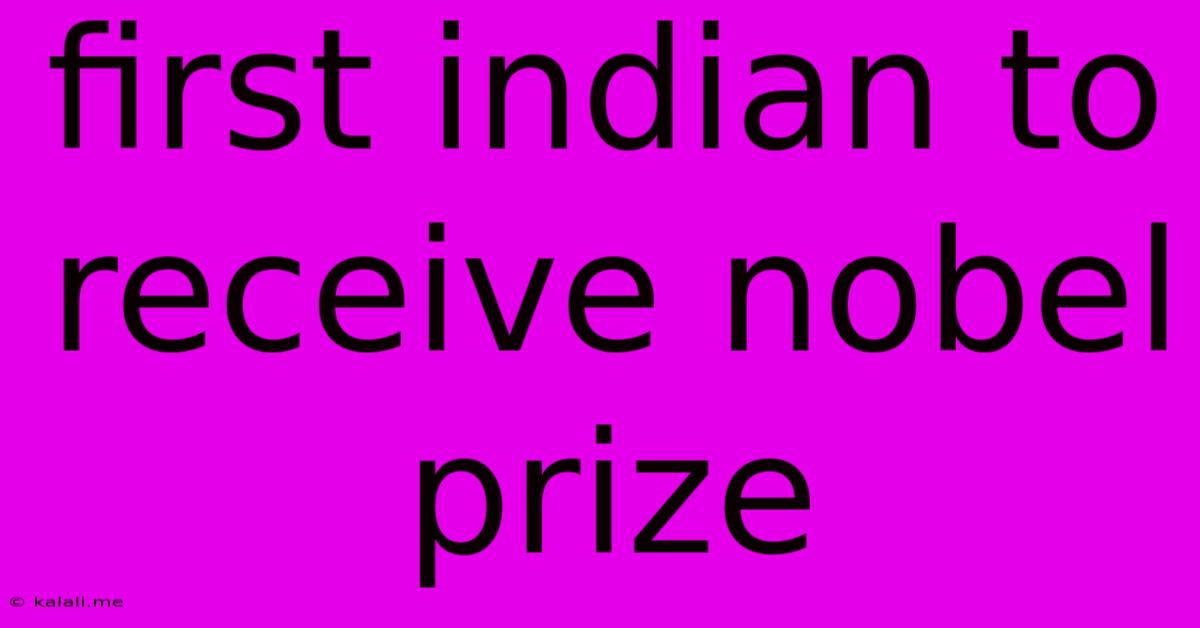First Indian To Receive Nobel Prize
Kalali
Jun 15, 2025 · 3 min read

Table of Contents
The First Indian Nobel Laureate: Rabindranath Tagore and His Literary Legacy
Meta Description: Discover the story of Rabindranath Tagore, the first Indian to win a Nobel Prize, his groundbreaking contributions to literature, and the lasting impact of his work. Learn about his life, his philosophy, and the significance of his Nobel Prize win in 1913.
Rabindranath Tagore, a name synonymous with Bengali literature and Indian cultural identity, holds a unique place in history as the first Indian to receive the Nobel Prize in Literature. Awarded in 1913, his win marked a significant moment, not only for India but for the global literary landscape. This achievement transcended mere recognition; it cemented his status as a towering figure, whose influence continues to resonate across generations.
A Life Dedicated to Art and Social Reform
Born in Calcutta (now Kolkata) in 1861, Tagore's upbringing within a wealthy and influential family fostered his artistic inclination. His early exposure to music, poetry, and painting shaped his multifaceted creativity. However, his life wasn't solely dedicated to artistic pursuits. He was a profound social reformer, deeply concerned with the socio-political issues of his time, advocating for education reform, rural upliftment, and women's empowerment. These deeply held values permeated his writings, often serving as a powerful commentary on the societal realities of British India.
The Nobel Prize-Winning "Gitanjali"
Tagore's Nobel Prize was awarded for his Gitanjali, a collection of profoundly moving poems originally written in Bengali. Translated into English by the author himself, Gitanjali captivated the Western world with its simple yet evocative exploration of spiritual themes, human relationships, and the beauty of nature. The poems, often characterized by their lyrical quality and spiritual depth, resonated deeply with readers, showcasing a unique perspective that blended Eastern mysticism with Western romanticism. The collection showcased his mastery of language, his ability to evoke powerful emotions, and his profound understanding of the human spirit.
Beyond Gitanjali: A Vast Literary Output
While Gitanjali remains his most celebrated work, Tagore's literary contributions are far more extensive. He was a prolific writer, composing novels, short stories, plays, essays, and songs (Rabindra Sangeet), each showcasing a unique style and profound insight. His works explored themes of nationalism, spirituality, love, loss, and the complexities of human existence. His novels, such as Gora and The Home and the World, delve into the social and political turmoil of India during the early 20th century. His plays often served as allegorical representations of societal issues, using drama to convey his critique and vision for a better future. His songs, deeply rooted in Bengali culture, remain popular and continue to be sung across the Indian subcontinent.
Tagore's Lasting Legacy
Rabindranath Tagore's influence extends far beyond his literary achievements. He established Visva-Bharati University, a pioneering institution that emphasized intercultural understanding and a holistic approach to education. His vision of education was forward-thinking, emphasizing creativity, critical thinking, and a deep connection to nature and humanity. His legacy continues to inspire artists, writers, educators, and social reformers worldwide, a testament to the enduring power of his art and philosophy. His Nobel Prize win serves not only as a recognition of his individual talent but also as a symbol of India's rich cultural heritage and its contribution to world literature. His works continue to be studied, analyzed, and appreciated, solidifying his position as one of the most significant literary figures of the 20th century.
Latest Posts
Latest Posts
-
Relation Between Linear Velocity And Angular Velocity
Jun 16, 2025
-
Lcm Of 4 7 And 6
Jun 16, 2025
-
What Is The Opposite Of Proud
Jun 16, 2025
-
Sum Of Odd Numbers 1 To 100
Jun 16, 2025
-
The Asthenosphere Is Part Of The
Jun 16, 2025
Related Post
Thank you for visiting our website which covers about First Indian To Receive Nobel Prize . We hope the information provided has been useful to you. Feel free to contact us if you have any questions or need further assistance. See you next time and don't miss to bookmark.